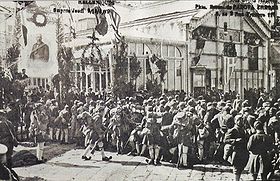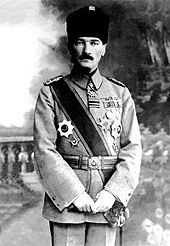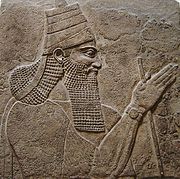The political impact of the Great War on Africa and South Asia was minimal; it essentially consisted of German colonies being appropriated by other European powers. The devastation in Europe did nothing to undermine the appetite for other peoples’ land. In sub-Saharan Africa, however, there was a tremendous loss of life. The military casualties were trivial, in total amounting to less than those suffered in a single day of any major offensive on the Western Front, but native civilian deaths were overwhelming.


Relatively few Blacks served in a military capacity, primarily with the Germans, but all the belligerents required bearers, tens of thousands of them. By 1917 a million porters had been conscripted, mostly in East Africa, and perhaps 100,000 had died, typically of disease. The mass conscription meant a shortage of farm labor and thus a shortage of food, aggravated by the confiscation of food and cattle by the military forces. This and poor rains in 1917 resulted in a famine that killed another 300,000 civilians, and then in September 1918 the Spanish flu arrived and accounted for 1,500,000 to 2,000,000 deaths.
The only non-European area (apart from Asiatic Russia) to undergo serious and lasting change because of the Great War was the Middle East. The dissolution of the Ottoman Empire created a new pattern of states, few of them actually independent, but ironically Turkey itself benefited, becoming a compact Anatolian state with no need to administer and guard the relatively unproductive territories to the south. Initially, however, even Anatolia was to be partitioned. The Greeks, promised land in Anatolia and Thrace, decided to push their claim immediately and sent 20,000 troops to Smyrna (Izmir) in May 1919; violence resulted and the Greco-Turkish War (or Turkish War of Independence) was underway.

Greek troops enter Izmir
The Turkish National Movement, led by Mustafa Kemal (later known as Atatürk) of Gallipoli fame, was adamantly opposed to any partition of Anatolia and was already mobilizing forces, guessing the Allies and their meagre garrisons would not resist. Armed by the Bolsheviks, who wanted part of Armenia (at the moment an independent state), Kemal first dealt with the Armenians in the east and the French in the southeast. The Greeks, meanwhile, had occupied most of Western Anatolia during the summer of 1920, and in August of that year the Allies ratified their promises of partition with the Treaty of Sèvres.

Mustafa Kemal

Meanwhile, in November 1920 the Venizelist government in Greece was replaced, through elections, by the Royalists (remember the National Schism?), who opposed the war, and on 19 December King Constantine I, deposed in 1917, returned to the throne. Nevertheless, the Greek advance towards Ankara, the seat of Kemalist power, continued into 1921, and by August they had come to the Sakarya River, about 50 miles from Ankara. The Turkish army, entrenched along the river, was still outnumbered but was now a better equipped and trained force, and the Greeks failed to break through, a strategic victory for the Turks. The Greeks began withdrawing westward.

King Constantine I
A stalemate set in, and in March 1922 the Allies, who were now losing interest in supporting the partitions and discussing the abandonment of the Treaty of Sèvres, called for an armistice, which was rejected by Kemal. In August he launched his offensive and despite being outnumbered two to one he cleared the Greek army from Anatolia by 18 September, and on 24 July 1923 the Treaty of Lausanne confirmed Turkish control of all of Anatolia and eastern Thrace. More than a million Anatolian Greeks were resettled in Greece, while about a half million Muslims left Greek territory. The nearly 3000 year Greek settlement in western Anatolia had ended.

The Turks enter Izmir
Finally, the former Ottoman Empire. Remember the Sykes-Picot Agreement of 1916? France and Britain had made many promises to the Arabs and Jews about independence, but behind the scenes they had agreed to establish spheres of influence. All this was known of course, inasmuch as the Bolsheviks had published all Russia’s secret treaties in late 1917, and they declared no interest in the piece of eastern Anatolia assigned to Russia. The British began an unending stream of weak arguments that King Hussein had misunderstood the earlier agreements, but he refused to sign the Versailles Treaty. The British continued negotiations with Hussein until March 1924 and a half year later they switched their support to King Ibn Saud of Riyadh (Nejd).

Zones of French (blue), British (red) and Russian (green) influence and control established by the Sykes–Picot Agreement.

Feisal Hussein and Lawrence at Versailles
With no opposition from the British Ibn Saud was free to expand his power in Arabia, and Hussein’s days as King of the Hejaz were numbered. The Hejaz was conquered in 1925, and the following year Ibn Saud became King of the Hejaz. By 1929 Ibn Saud, as King of Hejaz and Nejd, controlled all the Arab Peninsula, excepting Oman, Yemen and the Gulf kingdoms, in which the British had interests. On 23 September 1932 the two states were united as the Kingdom of Saudi Arabia, and with the discovery of oil this repressive medieval autocracy became the darling of the West and ultimately a close and increasingly uncomfortable ally of the United States. And with it came the poison of Wahhabism, the most extreme and vicious form of Sunni Islam.

Ibn Saud, King of Saudi Arabia

Hussein, former King of the Hejaz

Ottoman Arabia

The Kingdom of Saudi Arabia
The Versailles Treaty created the states of Palestine, Lebanon, Syria and Iraq from the Ottoman provinces north of the Hejaz; in April 1921 the Emirate of Transjordan, carved out of southern Syria and eastern Palestine, was recognize as a state. But these “independent” states were all to varying degrees controlled by France and Britain through League of Nations Mandates., which allowed the Mandate power to determine when an area was ready for complete independence. The French Mandate covered Lebanon and Syria and the British Palestine and Transjordan; because of widespread revolts there was no Mandate for Iraq, but the Anglo-Iraqi Treaty of 1922 effectively gave the British control over the area – and the oil. The Zionists fared a bit better. They did not get a Jewish state, but Zionism had been recognized and the Balfour Declaration provided some hope for a new Israel.

We are now living with the legacy of these post-war arrangements. Iraq was granted full independence in 1932 (though British influence clearly remained), but the other Mandates were not given up until after the Second World War, as colonialism was collapsing. The Arab world quite justifiably felt betrayed by the West, certainly by the French and British, and the foundation of contemporary Arab resentment of the West (and its values) and the emergence of extremist Islam can be laid at the door of Versailles. As can the disaster of Iraq, stitched together from areas with little sectarian relationship to one another and plundered by the British.

Not being officially involved in the settlement of the Middle East and espousing a policy of self-determination, the Americans were generally spared of any blame, but in 1948 Great War veteran President Harry Truman, against the advice of his advisors, threw the support of the United States behind the establishment of the state of Israel. Quite understandably, the Arab world saw this as one of the last gasps of western colonialism, especially since most of the new Jewish population came from Europe and America and their new state had the ultimate military backing of the United States. The autocratic and aggressive nature of her neighbors notwithstanding, Israel’s rise to regional superpower and the increasing callousness and disregard for established international law embodied in her policies fueled further resentment and extremism. And now America, tied to Israel with the “passionate attachment” Washington warned of, reaps the hate.






















![enhanced-30843-1420643123-9[1]](https://qqduckus.files.wordpress.com/2015/01/enhanced-30843-1420643123-91.jpg?w=238)
![enhanced-15505-1420644639-7[1]](https://qqduckus.files.wordpress.com/2015/01/enhanced-15505-1420644639-71.png?w=217)













